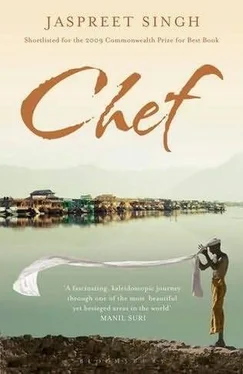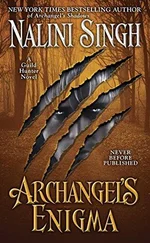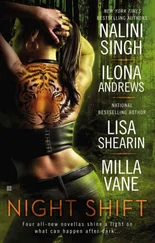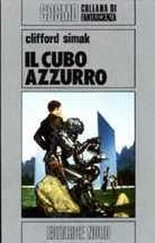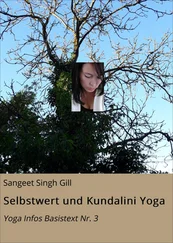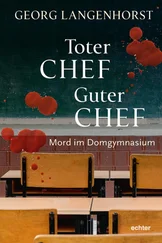The man’s pretty wife is putting kohl around her eyes, surveying her face in a miniature mirror, the shape of a perfect oval.
News is over. Back to cricket. The man, listening again. Please lower the volume, I request. He contorts his face. Please, I beg you, I say again. It is past midnight. He bows, apologizes, and to my surprise turns off the radio and begins reading the paper. As far as the dogs are concerned I don’t think we Indians should object at all. Gandhi loved animals. The dogs have done no harm to the father of the nation. If we are hell-bent on taking offence then we must take offence to the local thugs and criminals who deliver long speeches paying so-called homage at the Peace Memorial.
On the front page of the paper there is a picture of the American President eating a mango. He is eating the reddish-yellow fruit with a knife and a fork. I see it in the flickering light. The picture is making me increasingly uncomfortable. This is not the proper way to eat a mango, I say to myself. They are supposed to be eaten the way Father used to.
Father never used a knife to cut mangoes, he would suck them.
He would eat several at a sitting, one by one, all varieties, sandhoori, dusshairi, langra, choussa, alphonso. He loved good food. Good chutney. He was right-handed but held a chapatti in his left; he scooped up the chutney with a torn bit of chapatti. If curried lamb was served, he liked gravy more than the pieces. He ate kebabs without a piyaz. Even now I can see him clearly. Father is home on a two-day leave from his regiment, he is eating dinner with another man in uniform, also a Sikh, I call him uncle, they are talking about colonels and generals, and war and enemy, us versus them. I can see this although I am hiding under the table. And I can hear them. Uncle’s foot taps my leg. I run to my room, from under the table. Father scolds me mildly for not doing my homework. From behind the curtain I watch Father sucking on the fruits one by one. Uncle has stopped eating, he is telling Partition stories, but Father continues. Even now I can see him squeezing the pulp upwards. To this day I remember his hands. His fingers were those of a musician.
But.
There are things he will never know. He has no idea about the anger I carry around to this day. Deep inside – so many unresolved emotions. Perhaps my cancer is the consequence of the shame and guilt and anger that never found a passage out of my body. The most important things in our lives can’t be squeezed out.
I never wanted to join the army. In Delhi my desires were different. I had just had my eighteenth birthday. I woke up late that morning. Frying mustard oil and aloo parathas stung my eyes. Mother scolded me (from the kitchen) to hurry up. I rushed to the bathroom with soap and when I opened the door I saw my cousin was inside. I had opened the door thinking the bathroom was empty, but she was inside, washing herself. She was very beautiful, my cousin, a married woman, and later that day, at college, I could not forget her dark nipples. Drops of water moving, crawling on her cinnamon skin and wheat-colored breasts. I felt some strange forbidden joy. But at the same time I felt guilty, as if I had committed a crime. She was the first woman I had seen completely naked, and those two seconds kept coming back to me that day in the college, first during math class, and then during history. I saw her wet body everywhere in the classroom and I kept returning again and again to the moment she had buried her head in her hands (after a very brief eye contact) and I felt I could not live without touching her bare breasts. What was I doing in the classroom? The teacher was covering the subaltern history of Indians (especially Sikhs) who had died in Europe fighting the two World Wars. Outside it was very bright and hot. Through the window I noticed my mother rushing towards the college, accompanied by a man in a camouflaged uniform. I thought that my cousin had reported me, and I was to be punished.
Mother stood by the door and had a fast talk with the teacher, and right away the teacher instructed me in a soft voice to pack my books. Her face froze as I marched my shadow to the door. There was pin-drop silence in our class. It was then I sensed something terribly wrong had happened. The man standing behind Mother looked very stiff; his face had no spark and his uniform was crisp and starched without a wrinkle. He was holding a black cap in his hand.
They walked me close to the road beyond the spot where stray dogs were barking, a goods train passed by, parallel to the road, and the man asked if he could have a word with me.
‘Young man, the whole nation is very proud of Major Iqbal Singh.’
There was a mist in Mother’s eyes. Unlike other women she rarely wept in public. She held my hand and slowly quickened her step. We walked in the same direction. Home. That was the last time we walked together. The dogs didn’t come after us.
Now that I think about it she too was fighting battles. While my father was fighting a war in Kashmir with the Pakistanis, my mother was fighting battles with herself. She stopped in the middle of the road and hugged me, then let me go. She wanted to be alone.
At home instead of Father and death, I kept thinking about my cousin’s cinnamon body. That evening my cousin and her husband came along with many others to our house. They drank imported Coke and spouted the standard things. When the mourning was over I took the empty bottles into the street and lined them up and kicked them one by one, the bottles rolling further and further away from me. A plane passed overhead, creating a white cloud. The windows of our house rattled.
I knew then.
When I woke up the next morning stray dogs kept barking in the street, and my whole body felt sick. I felt his presence in the room. I see myself running up the stairs to the room where he kept his black military trunk. In the trunk I found his pistol and from the roof terrace I started aiming, shooting at the dogs in the street until mother screamed at me from the other side of the clothesline. People flocked to our house. What is wrong with you? Poor thing, I heard one say. You are the son of a very brave man. Why are you muddying your father’s name? This boy has done nothing wrong, said Mother. She could speak no more. When the crowd left I heard the single bark of a dog on the pavement. It was the only one that did not flee like others towards the bazaar.
‘How many did you kill?’ asked Mother.
‘None.’
‘Don’t lie to me.’
‘One.’
‘Dog killer.’
‘One is injured,’ I said.
Mother begged me not to join the army.
‘You never wanted to.’
‘I’m going to join Father’s regiment.’
She begged me not to move to Kashmir. That place is foreign to us, it is filled with turmoil, she said. She tried to persuade me to follow my original plan: study two more years, get a civilian job and then get married.
‘You’re my only child,’ she said.
I clicked my heels and saluted her, the way Father used to.
On the way to Kashmir the first time I took the train, I carried an old black and white photograph in my wallet. I recall saying to myself that the thing looked different now, because the man in the photo was actually dead. The officer’s uniform, the medals on his chest, the epaulets, the turban with a red regimental ribbon, and the shining stars – everything looked different. Father is not alone in the photo, he is standing in the middle of the parade ground with three others. It is their graduation day. Father is the only one in a turban. With great amusement he is observing the caps of his fellow officers. The caps are floating in the air and are about to begin a sudden downward descent. (Cadets, the moment they become officers, follow an odd graduation ritual: they toss their caps up in the air to mark the turning point in their lives.) Father is unable to participate fully in the ritual. His turban is intact. He is one of them, but he is different. Like them he is young, filled with hope. Did he know then that soon he would become the yellow photograph in my hand? He could not have known then, and neither could I have known that soon his son would try to forget him, but the harder he would attempt, the more disastrously he would fail. On that train journey the photo terrified me. I remember opening the grimy window, tearing the thing into pieces, letting it go. There was thick fog outside, and the pieces went up and down in the wind and vanished in the fog. At the time a fellow passenger in the compartment was carrying a basket of unripe mangoes. Just like right now – this carriage has the same pungent odor.
Читать дальше
Конец ознакомительного отрывка
Купить книгу
